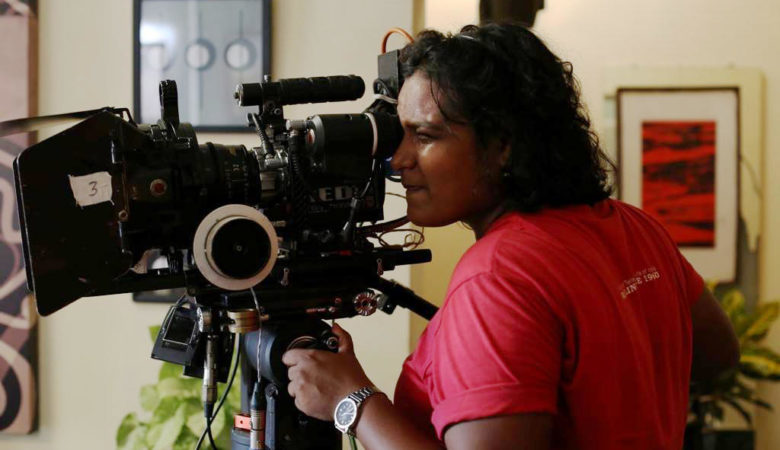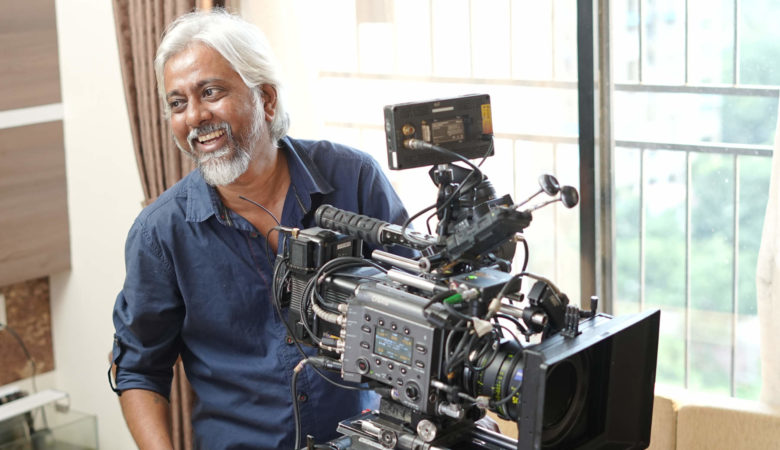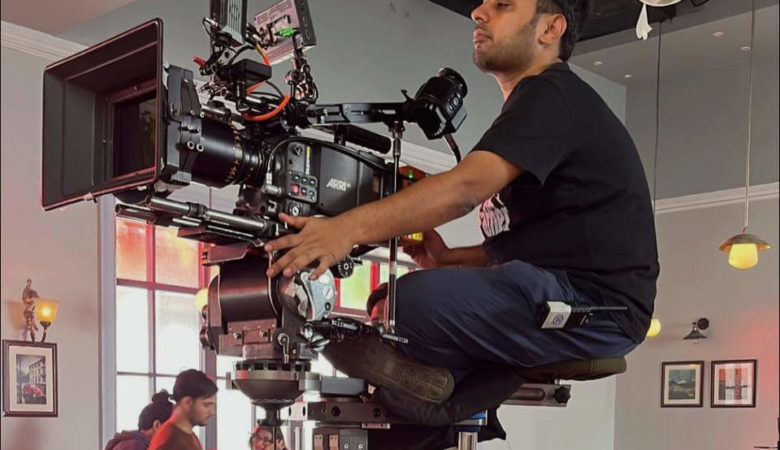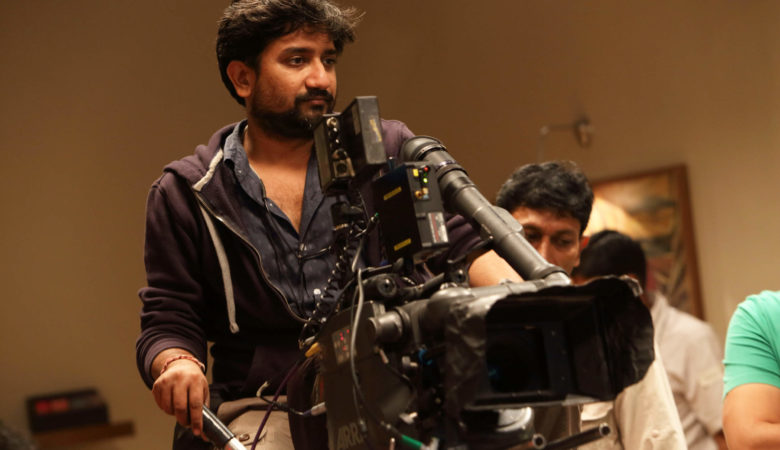Riju Das is a professional cinematographer who was born and raised in Calcutta. After completing his graduation he enrolled for the 3 years’ diploma course in Cinematography at the Film and Television Institute of India, Pune. Since finishing the course he’s been working in Bombay. He has shot three Marathi language feature films.Two of them ‘Gachchi’ and ‘Home Sweet Home’ have been released commercially and ‘Habaddi’ is undergoing post-production. Apart from that he’s shot various non-fiction films including Kamal Swaroop’s ‘Battle of Benaras’, Chandrashekhar Reddy’s ‘The Great Indian Elections 2019’ produced by National Geographic amongst others. He also paints and draws since he was a child, practices still photography and also loves engaging in sports like football and badminton.
As a child what were your early influences towards cinema?
The best part about cinema is that it derives from all the other pre-existing art forms. Even while in film school we had to look at paintings, listen to music, read literature etc. So learning about cinema happens to all of us invariably and subconsciously. For me it was like any other child of the 1980s. Those days there was no cable television and we would watch whichever films would be aired on television. Having grown up in Calcutta one was fed a steady dose of Satyajit Ray films, specially the ones he made for children. They would be aired during every summer holidays. Apart from that, even my parents showed me some socially conscious cinema. My mother showed us Mirch Masala by Ketan Mehta and some other such films and my father showed us classics like Guns of Navarone, God’s Must Be Crazy etc. We would hire a VCR device and VHS tapes from the local vendor and watch films on certain Sundays. Once in a while we children would also be taken to the theatre to watch films. Once cable TV came about in the mid 90s it opened up a whole new world of films from commercial Bollywood to Hollywood. Suddenly there was a barrage of films running throughout the day!
How did you first become interested in cinematography? Did you start with photography?
First of all, one has to understand that even though there are some key departments in filmmaking like direction, cinematography, editing, audiography etc. every department’s job is one, to tell a story. So everyone is a storyteller. Even the smallest of efforts by an assistant is also contributing towards telling the story. Hence everyone involved with the script is a filmmaker.
I first thought of filmmaking as a career while pursuing graduation. We had a paper called Film Studies and we were shown various films from all over the world as part of our curriculum. Not only that, we also had to make short films as part of our course. It was during this time that I figured I want to pursue a career in film-making. Why Cinematography? Since I was a kid i used to draw and paint a lot. So I was already interested in making images. Hence it followed as a logical choice for me to take up Cinematography.
The technical basics of Cinematography and Still photography are the same. The only difference is that in Cinematography there are multiple images running over a period of time to create a sense of motion. So the techniques of exposure or focusing etc. are the same. So one of the first ways to learn cinematography is to get a grip over Still photography. So just like everyone else I also started with Still photography.
What steps did you take to train yourself?
Exposure to all forms of art is crucial to learn filmmaking because it contributes towards developing a worldview that’ll define the kind of work we do as cinematographers. So apart from Still photography I started looking at paintings, studying them, watching plays, reading literature etc. Apart from these it was important for me that I go to a place where I can dedicate time and energy to learn the art and craft of Cinematography. So i decided to apply to FTII, Pune which has already produced some of the finest names in Cinematography in India today. That was the best decision I have made!
Have you assisted anyone? How does it help one?
I have assisted a couple of Cinematographers. Sudhakar Reddy and Anay Goswami, both of whom are graduates of FTII.
It has really helped me a lot. Both of them have very different approaches to Cinematography and working with them has taught me a lot about the art. Both of them have worked with the best directors and producers in India and what it has taught me is how to mould oneself to adapt to the director’s vision of the film that’s being made.
How did your first film project come about?
I was working as an assistant on a film and the Executive Producer on that film really appreciated my work. So when he went on to produce his first film he asked me to shoot it. I met the director and we hit it off immediately. That’s how my first project happened.
What is perhaps the most important factor for you to choose a script?
There are two possible cases here. If you know the director of the film well in most cases you agree with his/her worldview and what s/he has to say. In that case there’re no doubts about how well one can collaborate.
If you’re meeting a director for the first time it’s the person and the script that matters. It’s extremely important to agree with the director’s worldview, what s/he thinks and feels about the human condition. If that doesn’t happen you will never be able to collaborate with that person no matter how beautifully you shoot the film, that is if the project goes through. You will never be able to come to the same page because your concerns are very different.
When you’re telling a story you’re putting yourself out there. You’re exposing your innermost thoughts and feelings. So will you be able to tell the same story if your thoughts and feelings don’t concur with those of the director’s?
Is cinematography intuitive or is it something you learn?
It is always a mixture of both. The art and craft of it is something one will have to learn by practicing. There isn’t a substitute for practice. The more you shoot the more you will learn and there is no end to learning. What a certain diffusion paper can do to your light, what a little shift in the angle of light can do to the image is something you will keep learning throughout your practice as a Cinematographer. At the same time, it’s important to trust your intuition for it’s nothing but so much practice that it becomes part of your memory, both mentally and bodily. For example, you practice moving the camera in a particular manner so many times that your mind and body memorises it. Your intuition also demonstrates how well you perceive and observe things around yourself. A person with great instincts can almost predict how a subject will move simply based on his experience of observing real situations. Hence it’s very important for cinematographers to Dona lot of documentary work which relies heavily on observation and intuitive thinking.
Tell us something bout your latest film.
My latest film is called ‘Aamis’. It’s an Assamese language film directed by Bhaskar Hazarika. It premiered at the 2019 edition of Tribeca Film Festival and I was also nominated in the Best Cinematography category. It was also screened at the recently concluded MAMI Film Festival. It’s a love story between a young man pursuing his doctorate in university and a paediatrician who is married and is also a mother and how their love goes horribly wrong. It deals with repression in our society.
Where do you seek inspiration from?
While in film school we had a workshop with the great cinematographer, the Late Ashok Mehta. “Nature is the best teacher”, he used to continuously tell us. Nature has always been a great source of inspiration for me. Though he was only talking in the context of light and lighting by nature I don’t imply only natural resources. Nature also encompasses the human condition. How people and how I behave, or how my pet cat behaves can also serve as inspiration. The thing with inspiration is that it is a continuous and an unconscious process. One doesn’t wake up and decide to find inspiration one day. Sometimes you won’t even realise that something has inspired you. At a later stage you may remember that such a thing happened and inspired you to create something. Also considering that an artist chooses a medium of expression based on what s/he loves doing the process and practice of creating something is a great source of inspiration by itself. One wakes up everyday wanting to enjoy that practice. One lives for that.
What is in the kitty right now?
Right now I’m finishing a Marathi film that I’d shot last year. It’s very VFX heavy so it’s taking a bit of time to get over. Apart from that I’m in talks for a couple of other films.
What’s your dream project?
Every project is a dream project. With the tools I’ve got in my hands I can do hundreds of things as a cinematographer and I’m more than happy with that.
Your most memorable blunder?
One of the most common blunders that a cinematographer makes, specially if one is shooting non-fiction is to think that you’re running the camera when you’ve actually stopped recording and vice versa. So one is coolly looking at the LCD screen and moving the camera feeling like what a lovely shot this is and when it’s time to cut one realises that you’ve not been recording at all. And then the director is glaring at you and you’re just looking around helplessly. In the hustle and bustle of shooting it keeps happening once in a while.
Any advice to the aspiring cinematographers?
As a cinematographer one should try to develop a worldview. It’s not just about finding great camera angles or placing lights here and there. One has to communicate and in order to do that one must relate to every aspect of life. Read lots of books, listen to music, doodle, talk to people, invest in them, understand where they come from and relate that to your own experiences. The syllabus for cinematography is everything under the sun. In that regard a cinematographer is also a filmmaker, as much as the director or the audiographer or the editor.
What book, music, movie are you enjoying right now?
I’m currently reading a couple of books. ‘The Jataka’ edited by E. B. Cowell which are stories of the Bodhisattvas that came before The Buddha in various forms. The second one is ‘Mirrors – Stories of Almost Everyone’ by Eduardo Galeano.
I keep listening to all kinds of music. Currently I’m listening to a lot of Ali Farka Toure who belongs to a long line of travelling minstrels from Sub Saharan Africa.
In films, I’m still dwelling in the after effects of ‘The Lighthouse’ by Robert Eggers and ‘It Must be Heaven’ by Elia Suleiman.









Leave a Reply